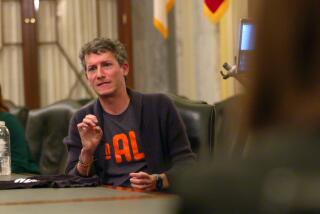Op-Ed: A writer (literally) loses her voice

- Share via
I first notice something off about my voice on a balmy December evening at a reading in Sausalito in 2019 with several other writers. I have always enjoyed the theatrical aspect of reading my fiction aloud. Feeling the rhythms of my sentences coming alive, riding the cadences, inserting pregnant pauses.
Sometimes, the work sounds better than I know it to be. But this night my normally nimble mouth and tongue aren’t wrapping themselves cleanly around certain words. The music of the prose is absent. The flow. Afterward, chatting with the other writers, no one else seems to notice anything wrong.
A month later: My partner regards me strangely as I repeat certain words over and over, separating the syllables and enunciating the consonants as clearly as I can. Vul-ner-a-bil-it-y. Nor-mal. An-i-mal.
“Something’s going on,” I say. “I think my teeth have migrated.”
He laughs, hearing nothing amiss. After the pandemic hits, when our neighborhood goes outside at 8 p.m. for a session of lockdown howling, there is nothing at all wrong with my voice.
But by late spring, I know it’s time to get help. My doctor refers me to an ear-nose-throat specialist. In his office, I coax words past my sluggish mouth and mask, working hard to enunciate clearly, afraid incoherent speech will be conflated with an incoherent brain.
A camera slides up one nostril and down to the opening of my larynx. “Say ah,” I’m instructed. My nose, throat and vocal cords are proclaimed to be healthy, despite the “glottic fry hoarseness” in my voice.
I enter the world of medical diagnosis. Tests probe my spine, my brain, my nerves, my muscles, my cells. My insurance company refuses to pay for an MRI. I get on the phone to persuade them to cough up.
A man answers. “How can I help you?” he asks. I begin to state my case, but what emerges is a monotone utterance that sounds like a growl, not nuanced speech. Timbre, pitch, inflection, even volume, are all beyond my control.
“Excuse me?” he says.
Nine months out, I speak ever more slowly, with no inflection, and undeniable slurring. Friends still understand me, but clerks and receptionists ask me to repeat things. My son is concerned. “Is your mind still working?” he asks. Even as I laugh and reassure him my brain is fine, his question cuts to the core of my fears.
I am perched at the edge of another examining table. The doctor has been testing my strength and reflexes. Now he asks me to raise my gown above my knees. He rolls his chair up close and fixes his gaze on my bare thighs. His concentration is absolute. Finally, he murmurs, “Yes.”
Fasciculations. Muscle tremors I neither see nor feel. He and the other doctor in the room, a woman, exchange a look.
“Have you ever heard of bulbar-onset ALS?” he asks.
::
I have stepped through a portal and on this side everything feels surreal. My days are finite — but haven’t they always been? It isn’t clear exactly when I will die, but I certainly won’t live into my 90s as my mother and grandmother did. Nor is it likely I will live the long life Stephen Hawking lived, as bulbar-onset amyotrophic lateral sclerosis — the term for cases in which patients first notice speech or swallowing problems — is more aggressive than the limb-onset ALS he had.
I don’t feel morbid, but thoughts of death accompany me as I write, as I walk and talk with friends, as I pay taxes, as I make plans for the release of a new book. Within 10 days of the diagnosis, I have married my partner of 20 years. We joke about what a relief it is that I will probably not have to endure another election cycle with Trump as a candidate.
We get our “affairs” in order. I look into voice assistance technology and, because my voice is already compromised, I ask my sister if she will record hers as a stand-in for mine. A synthesized version will be created from her recording.
My failing speech remains a focus, a symbol of fading agency, but I am fully aware this is only one form of agency I will lose. The progression of the disease involves the slow erosion of the voluntary muscles, already well underway in my vocal cords and mouth. I will lose my ability to eat and walk and dress myself. Breathing will become difficult, and eventually, if I live long enough, I will face full-body paralysis.
I have lived my life as most writers do, standing apart, observing. I have believed I’m a survivor, tougher than most. It turns out I’m not tougher at all. My voluntary muscles are invisibly stamped with sell-by dates I can’t control. My flesh is wearing out just as everyone else’s flesh is wearing out. A bit more quickly.
My husband’s birthday is upon us, and we make plans for a socially distanced gathering. Having just learned about bhangra dancing — a dance of joy — we decide it’s the perfect way to celebrate. We set up a YouTube training video on our back porch and eight of us form a circle. We do our best to lift our legs high then hop while holding our bodies erect, arms above our heads. Clumsy, we’re doubled over in laughter.
I freeze this moment, vowing to make it my future: body-weakened but still trying, surrounded by friends, suffused with joy.
Cai Emmons is an award-winning writer whose latest novel , “Sinking Islands,” will be published in September. She lives in Eugene, Ore.
More to Read
A cure for the common opinion
Get thought-provoking perspectives with our weekly newsletter.
You may occasionally receive promotional content from the Los Angeles Times.










